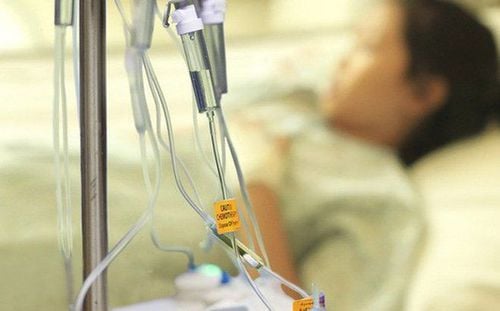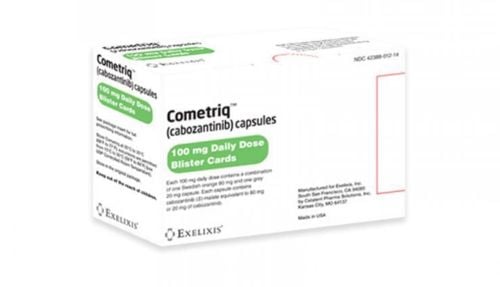This is an automatically translated article.
Zydelig is a drug used in the treatment of cancer, when first-line therapies have failed. Let's learn more about the uses and notes when using Zydelig through the following article.
1. What is Zydelig?
Zydelig has the main ingredient Idelalisib, which is a PI3K inhibitor.
Idelalisib is a targeted therapy drug that works on specific characteristics of cancer cells to help stop cancer from growing and spreading. Specifically, Zydelig is a kinase inhibitor, which works by inhibiting the action of a specific protein called a kinase.
Zydelig is formulated as a tablet and is available in two different strengths, 100mg and 150mg.
2. Uses of the drug Zydelig
Indications:
Zydelig is used to treat recurrent chronic lymphocytic leukemia (CLL), often in combination with rituximab in patients who can only take this drug because of other comorbidities. Contraindications:
Zydelig is neither indicated nor recommended for the first-line treatment of any patient, including patients with CLL, small cell lymphoma (SLL), follicular lymphoma (FL). and other non-Hodgkin lymphoma conditions. Bentamustine and rituximab or in combination with rituximab are not indicated and recommended for the treatment of patients with follicular lymphoma (FL) or small cell lymphoma (SLL) and other non-Hodgkin lymphomas. You have a history of allergy to the active ingredient Idelalisib or to any of the excipients in the medicine. Not intended for use by persons under 18 years of age.
3. How to use and dosage Zydelig
How to use:
Zydelig is in the form of tablets, should be taken with water. When taking orally, you need to swallow the tablet whole, do not chew or crush the medicine and can take it with or without food. Dosage:
Recommended dosage: One 150mg tablet twice daily. Continue treatment until disease progression or toxic drug cannot be continued. It is not known whether the drug is safe for patients requiring treatment for longer than several months. Dosage changes:
Dosage adjustment is required for cases such as liver disease or adverse drug reactions. For serious or life-threatening adverse reactions, the drug should be discontinued until resolved. If resuming Zydelig after interruption for other serious or life-threatening toxicity, reduce dosage to 100mg twice daily. Permanently discontinue Zydelig if another serious or life-threatening toxicity recurs following Zydelig.
4. Side effects when taking Zydelig
Common side effects include: Diarrhea, pneumonia, fever, feeling tired, rash, cough and nausea, malaria, sepsis and fever leukopenia. About 17% of patients had to stop using the drug due to side effects. Other serious reactions: Neutropenia; severe liver toxicity; diarrhea or a potentially fatal inflammatory bowel disease; severe pneumonia ; interstitial infiltrates in the lungs; fatal infection; Serious and fatal intestinal perforation has occurred in patients treated with Zydelig. Serious skin reactions may also occur: Fatal cases of Stevens-Johnson syndrome (SJS) and toxic epidermal necrolysis (TEN) have also occurred in patients treated with Zydelig. Cases of drug reactions with eosinophilia and other systemic symptoms have also occurred. The drug can occur many serious reactions, it is necessary to notify the doctor when experiencing side effects of the drug.
5. Things to note when taking Zydelig
Before taking this medicine tell your doctor if you have a serious skin reaction to any medicine. To make sure Zydelig is safe tell your doctor if you have ever had liver, lung disease, or a hole in your intestines.
Zydelig may cause serious adverse reactions in the liver, lungs or intestines. Some of these reactive conditions can lead to fatal complications. Call your doctor right away if you have any unusual symptoms such as upper abdominal pain, easy bruising or bleeding, dark urine, yellowing of the skin/eyes, cough, wheezing, trouble breathing, fever or chills cold, worsening stomach pain and vomiting.
Due to the risk of liver damage, it is necessary to monitor liver function before and during treatment. Discontinue use, then reduce dose or discontinue Zydelig if liver abnormalities are severe.
Diarrhea is very serious or life-threatening while taking Zydelig. Tell your doctor right away if your daily bowel movements increase by 6 or more. Zydelig can also cause a perforation in the intestines, so call your doctor right away if you have watery diarrhea or bloody stools.
Idelalisib can harm an unborn baby if the mother or even the father is using this medicine. Therefore:
If you are a woman, do not use Zydelig if you are pregnant. You may need to have a negative pregnancy test before starting this treatment. Use effective birth control to effectively prevent pregnancy while you are using this medicine, and prevent pregnancy for at least 1 month after your last dose. If you are a man, use effective birth control when your partner is at risk of becoming pregnant. Continue using birth control for at least 3 months after your last dose. Tell your doctor right away if a pregnancy occurs while the mother or even the father is using Zydelig. Do not breast-feed while using Zydelig and then for at least 1 month after the last dose.
Drug Interactions:
Inducers of CYP3A: Co-administration of Zydelig with strong CYP3A inducers should be avoided. CYP3A Inhibitors: Avoid concomitant use with strong CYP3A inhibitors. If alternative medications cannot be used, monitor patients more frequently for side effects of Zydelig. CYP3A Substrates: Concomitant use with CYP3A substrates should be avoided. Store the medicine in a tightly closed container away from moisture and direct sunlight. Medicines must be kept out of reach of children.
Above is the information about Zydelig, patients only use this drug when indicated and need to be closely monitored to avoid the risk of serious side effects.
Please dial HOTLINE for more information or register for an appointment HERE. Download MyVinmec app to make appointments faster and to manage your bookings easily.













